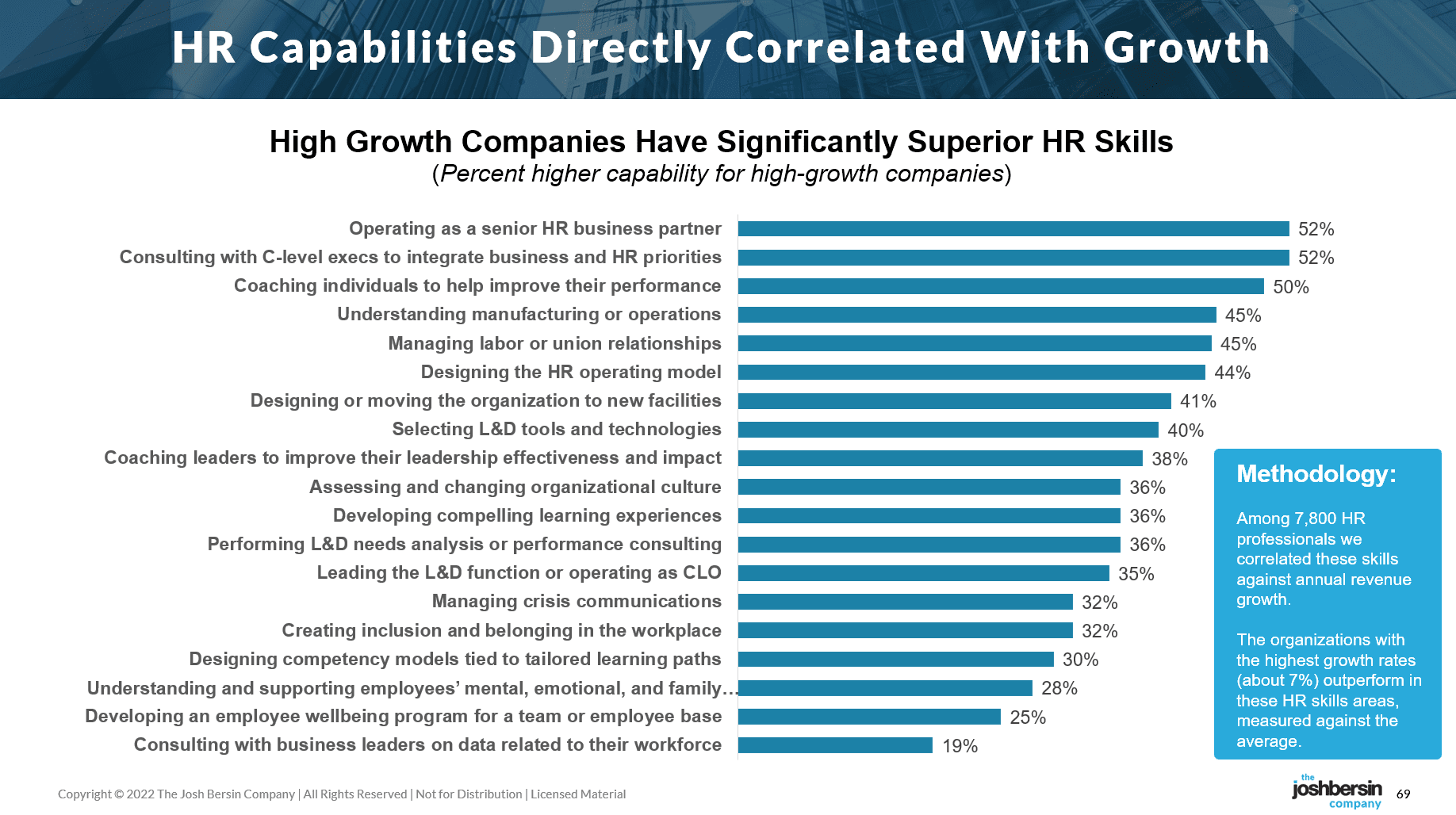Research Shows That High Growth Large Companies Have Distinct HR Skills
We have been analyzing data in our Global HR Capability Project and the results are striking. Among the 7,300 HR professionals who have completed our assessment (available to all Josh Bersin Company corporate members), the highest growth companies have significantly deeper HR skills in very important areas.
Here’s the data. We assessed more than 7,300 HR professionals using our 80+ capability model. This model, which is used by Microsoft, Walmart, and many large companies, lets HR teams assess their level of familiarity and experience in more than 80 different functional areas. It looks at knowledge as well as experience and covers all the major disciplines of HR, recruiting, and talent management.
In this analysis, we looked at the profiles of the respondents. This includes their tenure, job level, type of experience, and the industry, size, and growth rate of their employer. So we can see what HR teams in fast-growing, large companies look like relative to their slower-growing, perhaps lagging competitors.
What we found is important. The fastest growing companies (about 4% of the sample or less) have significantly higher capabilities in very specific areas. The chart below visualizes the results.
 |
Making Sense Of The Findings
Let me explain the findings.
In each of the 80+ capability areas, we correlated the level of capability vs. the growth rate of the company. We then looked at the companies in the highest growth segment (growing at over 15% per year) and compared their capabilities against the overall average in that area.
What we found is important: high-growth companies have HR teams that can partner with senior leaders, coach managers and executives, and have a deep understanding of the business’s operations. In other words, they are close to the business and they have credibility and experience in the business.
But there’s more. Note that these high-performing companies have a well-defined HR operating model, they have strong skills in corporate learning and learning technology, and they are good performance consultants. These skills are critical for growth because these companies are hiring, expanding their offerings, and rapidly moving people to new positions.
You can also see that these fast-growing companies have HR teams who are well above average in employee communications, inclusion and belonging, wellbeing, and mental health. Of the 80+ capabilities we studied, these are all “top-10” skills that correlate directly to organizational growth.
Recruiting Is Not The Answer
Note that recruiting skills, while important, do not rank in the top 15 capabilities. Why? Because as you’ll read about in our Global Workforce Intelligence research, larger companies can no longer grow through recruiting alone. They grow through development, mobility, retention, and strategic job design.
Recruiting skills are slightly higher in these companies, but not by a significant amount. What this points out is that growing a large business is all about strategic skills development, understanding organizational issues, working closely with senior leaders, and supporting operations. Not just hiring. In fact, the HR skills clusters most highly correlated to growth are “working with senior leadership,” “career growth,” “leadership coaching,” and “developing leaders.”
We are going to explain this further in the GWI research coming soon.
Bottom line: one of the most powerful tools to grow your company is to educate, develop, and align your HR team.
How Do You Advance Your HR Team
How do you accomplish this? At our Irresistible Conference we gave “HR Hero” awards to Microsoft and Walmart, two companies that lead in this area. These companies, along with many other of our clients, create development paths, formal career programs, job rotation, and strategic capability areas for HR.
Remember that HR professionals operate in a very complex and dynamic domain. HR leaders and their teams must excel at hiring, assessment, performance management, coaching, and a myriad of technical disciplines in training, rewards, culture, and technology. No HR person can be an expert in everything, so we need HR professionals to develop “full-stack” skills. So I hope this data convinces you to invest in the professional capabilities of yourself and your team.
Our assessment, which has now been validated with hundreds of companies, is a fantastic way for you to get started.
Bersin Research Is Back
Let me add one final announcement. We are back to doing some of the most amazing research ever. Through our corporate membership program we now offer you more than 400 different industry studies, case studies, tools, and professional development offerings in all areas of HR. Please contact us if you’re interested.
Additional Resources
